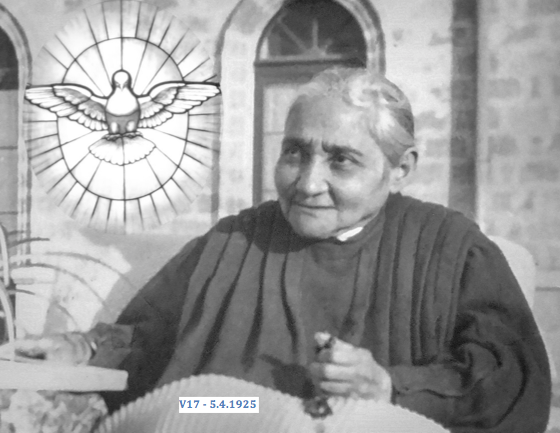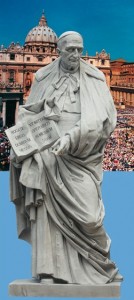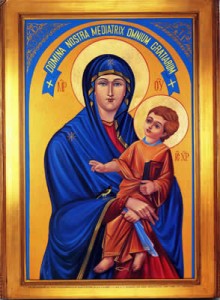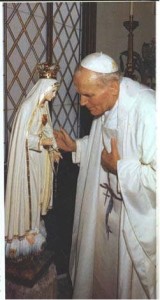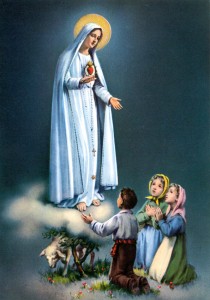Luisa: “I was feeling very afflicted, not only because of the privations of my Sweet Jesus, but also because I had received the unexpected news of the death of Reverend Father di Francia. He was the only one left to me, to whom I could open my poor soul. How well he could understand me – it was to a Saint that I would entrust myself, who had very much comprehended all the Value of what Jesus had Told me about the Divine Will. He had so much interest in it that, with insistence, he had taken all the writings with himself in order to publish them.” – V22 – 6.1.27
05/16 The greatest favor that can be done for a soul, is to make her know herself.
Book of Heaven
6/2/99 – Vol. 2
This morning, my most sweet Jesus wanted to let me touch my nothingness with my own hands. In the act in which He made Himself seen, the first words with which He addressed me were: “Who am I., and who are you?” In these two words I saw two immense lights: in one I comprehended God, in the other I saw my misery, my nothingness. I saw I was nothing but a shadow, just like the shadow formed by the Sun in illuminating the earth: it is dependent on the Sun, and as the Sun moves from it to other places, the shadow ceases to exist outside of Its splendor. The same for my shadow – that is, my being: it is dependent on the mystical Sun God, who can dissolve this shadow in one simple instant. What to say, then, about how I have deformed this shadow which the Lord has given me, which is not even my own? The mere thought of it was horrifying; it was stinking, putrid, all full of worms. Yet, in such a horrifying state I was forced to stand before a God so holy. Oh, how content I would have been, had I been allowed to hide in the darkest abysses!
After this, Jesus told me: “The greatest favor I can do for a soul, is to make her know herself. The knowledge of self and the knowledge of God go together; the more you know yourself, the more you know God. When the soul has known herself, as she sees that she can do nothing good by herself, her shadow, her being, transforms her in God, and it happens that she does all of her operations in God. It happens that the soul is in God and walks beside Him, without looking, without investigating, without speaking – in a word, as if she were dead. In fact, knowing the depth of her nothingness, she dares to do nothing by herself, but she blindly follows the trajectory of the operations of God.”
It seems to me that to a soul who knows herself it happens as to those people who travel in a steamer: in moving from one point to another, without taking a step of their own, they make long journeys, but everything by virtue of the steamer that transports them. In the same way, the soul, by placing herself in God, just like the people in a steamer, makes sublime flights on the way to perfection, knowing, however, that it is not her, but rather, she does it by virtue of that blessed God who carries her within Himself. Oh, how the Lord favors her, enriches her, and concedes the greatest graces, knowing that she attributes nothing to herself, but everything to Him. Oh, soul, you who know yourself – how fortunate you are!
5/15 Litany of Mary, Mediatrix of All Graces
Novena Prayers to
Our Lady Mediatrix of All Grace
And St. Louis de Montfort
|
The Litany of the Blessed Virgin Mary
|
Holy Mary, Pray for us!
Mother of God, and our Mother, Pray for us!
True Mother of the living, Pray for us!
Mother regenerating men in Christ unto God, Pray for us!
Mother of piety and of grace, Pray for us!
Mother of pardon and remission, Pray for us!
Partner in human redemption, Pray for us!
Recoverer of a lost world, Pray for us!
Recoverer of the ages, Pray for us!
Petitioner of all graces, Pray for us!
Suppliant all-powerful, Pray for us!
Advocate with thy Son for thy sons, Pray for us!
Obtainer of the divine mercy, Pray for us!
Dispenser of heavenly treasures, Pray for us!
Handmaid of divine blessings, Pray for us!
Fullness of grace to overflow upon all, Pray for us!
Succor of the Church Militant, Pray for us!
Ready helper of those in peril, Pray for us!
Devoted consoler of the sorrowful, Pray for us!
Conqueress of all error, Pray for us !
Protectress of the world, Pray for us!
Impregnable protection, Pray for us!
Propitiation of the divine wrath, Pray for us!
Refuge of all the unhappy, Pray for us!
Shelter of orphans, Pray for us!
Assured safety of the faithful, Pray for us!
Hope of all who despair, Pray for us!
Stay of the falling, Pray for us!
Uplifter of the fallen, Pray for us!
Cheer and comfort of the dying, Pray for us!
Peace and joy of mankind, Pray for us!
Our life, our sweetness and our hope, Pray for us!
Gate of Paradise, Pray for us!
Mystical stair of Jacob, Pray for us!
Key of the heavenly kingdom, Pray for us!
Channel of divine graces, Pray for us!
Throne of divine clemency, Pray for us!
Fountain of living waters, Pray for us!
Fountain sealed by the Holy Spirit, Pray for us!
Unfailing stream of mercy, Pray for us!
Asylum of the erring, Pray for us!
Haven of the shipwrecked, Pray for us!
Shining star of the sea, Pray for us!
Light of those who sit in darkness, Pray for us!
Chamber of spiritual nuptials, Pray for us!
Mediatrix of men with God, Pray for us!
Mediatrix after the Mediator, Pray for us!
Mediatrix reconciling us to the Son, Pray for us!
Mediatrix of sinners, staunch and true, Pray for us!
Mediatrix of all beneath the sky, Pray for us!
Mediatrix ever pleading for us, Pray for us!
Mediatrix set between Christ and His Church, Pray for us!
Mediatrix who hast found favor with God, Pray for us!
Mediatrix to win salvation for the world, Pray for us!
Mediatrix of the mysteries of God, Pray for us!
Mediatrix of all graces, Pray for us!
Lamb of God, Who takest away the sins of the world, Spare us, O Lord.
Lamb of God, Who takest away the sins of the world, Graciously hear us, O Lord.
Lamb of God, Who takest away the sins of the world, Have mercy on us.
V. Pray for us, our powerful Mediatrix,
R. That we may be made worthy of the promises of Christ!
Let us Pray.
O Lord Jesus Christ, our Mediator with the Father, Who hast deigned to appoint the Blessed Virgin, Thy Mother, to be our Mother also and our Mediatrix with Thee, graciously grant that whosoever goes to Thee in quest of blessings may be gladdened by obtaining them all through her, Thou Who livest and reignest with the Father and the Holy Ghost, ever one God, world without end. R. Amen.
Prayer of Petition
O Ever-Virgin Mother of God and Mediatrix of Grace who art the House of Gold within which dwells thy Son, our Mediator, Jesus Christ, we humbly beseech thee to grant our requests for our salvation and the salvation of the entire world. (Here pause and make your requests) Keep us close to the Vicar of thy Son in the unity of the One, Holy, Catholic, Apostolic and Roman Church. Hear our prayer and grant the requests we make to thee.
St. Joseph, Intercede for us.
St. Jude Thaddeus, Pray for us.
St. Mary of Cleophas, Pray for us.
St. Philip Neri, Pray for us.
St. Louis Grignion de Montfort, Pray for us.
St. Maximillian Kolbe, Pray for us.
|
Litany to St. Louis de Montfort Lord, have mercy on us. Christ, have mercy on us. |
Hail Mary Pray for us!
Saint Louis-Marie de Montfort Pray for us!
Ardent disciple of Jesus Christ the Incarnate Wisdom, Pray for us!
Eloquent preacher of the Cross, Pray for us!
Singer of the praises of the Sacred Heart, Pray for us!
Loving slave of Jesus in Mary, Pray for us!
Faithful son of the handmaid of the Lord, Pray for us!
Apostle of the Most Holy Rosary, Pray for us!
Preacher of the Mother of the Redeemer, Pray for us!
Servant of the poor and the afflicted, Pray for us!
Man of solitude and prayer, Pray for us!
Wonder of mortification, Pray for us!
Model of priests and missionaries, Pray for us!
Fervent minister of the Holy Eucharist, Pray for us!
Fearless champion of truth, Pray for us!
Restorer of devotion to the Blessed Sacrament, Pray for us!
Marvel of poverty and abandonment to Divine Providence, Pray for us!
Teacher of the people of God, Pray for us!
Founder of Religious congregations, Pray for us!
Apostle of the end times, Pray for us. Pray for us!
Obedient collaborator with the Pope and Bishops, Pray for us!
Thou seest the Face of God: obtain for us perseverance in the faith.
Thou shinest within Infinite Charity: obtain for us the gift of pure love.
Thou livest in the New Jerusalem: obtain for us the spirit of prayer.
Thou standst before the throne of the Lamb: obtain for us the wisdom of the Cross.
Thou contemplate the Mother of the Lord: obtain for us true devotion to Mary.
Thou dwellst with the Apostles of Christ: obtain for us missionary zeal.
Thou sharest in the communion of Saints: obtain for us love for the Church.
Thou art seated at the Table of the Kingdom: obtain for us the crown of glory.
Thou art a powerful intercessor before the Throne of God: hear our prayers
(here make your intentions in silence)
Let us pray:
O God, Who in the power of the Holy Spirit hast made Saint Louis-Marie an ardent apostle of Christ Crucified and a faithful son of the Virgin Mary; Grant that through his example and intercession we may be renewed in the spirit of our baptism and be always faithful to Our Lord Jesus Christ, Who liveth and reigneth with Thee and the Holy Spirit. One God, forever and ever. Amen.
Introduction to the Divine Will through Luisa Piccarreta – by Fr. Jim Blount, SOLT
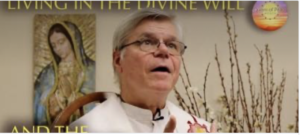
Click on the link below:
Introduction to the Divine Will through Luisa Piccarreta – by Fr. Jim Blount, SOLT.
5/14 – In 1948 Israel Becomes a Nation
How the exact date when Israel became a nation was prophesied in the Bible!
Summary:
From the date when Ezekiel measured the visionary temple in Ezekiel 40 unto 1948 when Israel became a nation are 1260 plus 1260 years.
It happens that 1260 plus 1260 days is an important seven-year period in the bible, referred to in Rev. 11-13 and elsewhere. (360 days x 7 = 7 years.)
5/13 Our Lady of Fatima
![M_FatimaOurLadyOfFatima[1]](http://luisapiccarreta.co/wp-content/uploads/2011/10/M_FatimaOurLadyOfFatima1-300x225.jpg)
Hidden Revelations: The Star of Esther and the Secrets of Fatima
By Marianna Bartold
It is said that the best place to hide something is in plain sight.
When Sr. Lucia, the last Fatima visionary, was called into eternity on February 13, 2005, both the Catholic and mainstream media sought the significance of the date. Most sources tied-in to May 13, noting the “13” in the anniversary date of the Fatima apparitions (1917), the papal assassination attempt (1981), and the late pope’s world consecration to the Immaculate Heart (1982). Ultimately, the mainstream efforts implied that Sr. Lucia’s death was a sign that Fatima is finished. Yet when an incredible Scriptural connection to February 13th and Fatima is examined as a whole, the opposite conclusion is made: While the date of Lucia’s death is definitely a sign, it is one alerting the world that we have reached the most critical chapter of the Fatima revelations.
Heretofore, it was never noticed that the date of Sr. Lucia’s passing links to a small yellow star, worn by Our Lady of Fatima. This star is a profound symbol long recognized by tradition as the “Star of Esther.” It points to an Old Testament history called The Book of Esther, which relates the story of a Jewish queen whose intercession saved her people from annihilation. Queen Esther’s mediation allowed the ancient Hebrews “to gather themselves together, and to stand for their lives” on “the 13th day of Adar.”
Until Lucia’s passing, the magnitude of “the 13th of Adar” could not be realized, even by Fatima scholars. Her death signals that, like the Jews who stood for their lives on the 13th of Adar, our own great battle against annihilation is begun. The secret significance of Lucia’s date of death has been right before our eyes all the time: It occurred exactly 40 minutes before sunset, on the 13th of February– in the Hebrew month of Adar.
P.S. to the Message of Fatima
Thus it seems that even Lucia’s death accentuated the entire Fatima message, manifesting a kind of heavenly post-script: “Hear, O foolish people, and without understanding: who have eyes, and see not: and ears, and hear not.”
In the Scriptures, the 13th day of Adar is one with historical portent. It marks the Machabees’ liberation of the Holy Land after a four-year combat; the battle throughout the Persian Empire during the reign of Esther; and the day warriors fasted before going out to war. The theme becomes obvious: An epic battle of God’s ecclesia against her enemies.
Because there are no insignificancies in God’s designs, there are great reasons for the Star of Esther adorning Our Lady of Fatima. In 2005 its purpose was again emphasized when God willed that Lucia should leave this world on a date directing our attention to both Esther and Our Lady of Fatima.

Of Mary, There is Never Enough
Just as the star adorning Our Lady of Fatima points to The Book of Esther, so does The Book of Esther point to all of the Fatima revelations. Esther’s theme centers on secrets and revelations, suggesting that The Book of Esther is a figure type for The Apocalypse (Greek for Revelations).
The Book of Esther appears to encapsulate what Fatima highlights about both the Virgin’s and the Church’s singular office in salvation history. Esther’s Star on Our Lady’s gown directs the Church to “the history of Queen Esther, who was herself a great [figure] type of our Queen Mary!”
But first, what is meant by a figure type? In its application to the whole of Scripture, an Old Testament figure type is a person, place, thing or event foreshadowing a New Testament archetype (a perfect model or type). The New Testament archetype is always greater than its Old Testament figure type.
Our Lord Himself plainly alluded to Scriptural figure types when, after His Resurrection, he appeared to two disciples on the road to Emmaus. “And beginning at Moses and all the prophets, he expounded to them in all the scriptures the things that were concerning him.” Our Lord used similar words when He subsequently appeared to the apostles.
So, too, “Mary appears on every page of the Old Testament,” said St. Bernard, In Genesis 3:15, God Himself literally prophesied Our Lady as “the woman,” but She is foreshadowed in many figure types – including but not limited to Miriam, Sarah, the foot-shaped cloud of Mt. Carmel, Ruth, Anna, Judith, and Esther; in the Gebirah (queen mother of the Davidic kings); in the mother of the seven Machabees; in the spouse of the Canticle of Canticles, the daughter of Zion, the burning bush on Mt. Sion, the Ark of the Covenant, the Root of Jesse, the City of God, and the Temple of Jerusalem.
In the Apocalypse, the Woman (the Virgin Mary) is prefigured by a “type within type” — “a woman clothed with the sun, with the moon under her feet, and on her head a crown of twelve stars.” This woman is a type of the Church, but the eternal Church is herself a type of Mary. With these examples, one begins to see what is meant by “types within types.”
The Book of Esther, The Book of Revelations
Among the many women who are figure types of the Virgin, Esther is foremost for three reasons: she interceded for her people; her Star appears on Our Lady’s dress; and the number “13” is central to her history. Space does not permit a thorough explanation of the doctrinal depths found in The Book of Esther’s figure types. However, the following comparisons are those most pertinent to the purpose of this essay.
· In the Old Testament, the fourth chapter of The Book of Esther relates the history of a “fair and exceedingly beautiful” virgin named Edissa, “who by another name was called Esther.” In the Old Testament of the Hebrew text, her name was H’d’ssah – meaning myrtle, a white, five-pointed, star-shaped flower.
· An orphan, Esther was raised by her uncle Mardochai, who had been carried away from Jerusalem at the onset of the Babylonian Exile. Esther was in her uncle’s care from the time she was a “little one” – a “figure-type” phrase foreshadowing the Virgin Mary’s sublime humility.
· Mardochai himself is an enigmatic “type within type.” He seems to embody in his person the faithful in exile but also a “vizier” or vicar, if not the Vicar of Christ.
· Esther and Mardochai lived in Susan, Persia’s capital city. The Persian king was Assuerus (a figure type for God) and his queen was Vasthi.
The Book of Esther, permeated with figure types, opens with the historical narration of the king’s feast. To grasp the types, one must understand that the first chapter of Esther alludes to the glory of the heavenly kingdom, the hierarchy of creation, and the Garden of Paradise, even to the first woman, Eve:

“Now in the third year of his reign, he made a great feast for all the princes, and for his servants, for the most mighty of the Persians, and the nobles of the Medes, and the governors of the provinces, that he might show the riches of the glory of his kingdom, and the greatness, and boasting of his power, for a long time, to wit, for a hundred and fourscore days. And when the days of the feast were expired, he invited all the people that were found in Susan, from the greatest to the least: and commanded a feast to be made seven days, in the court of the garden, and of the wood, which was planted by the care and the hand of the king.”
At the time, “Vasthi the queen made a feast for the women in the palace, where the king Assuerus was used to dwell.” However, on the seventh day of the second feast, she disobeyed the king’s solitary command “to show her beauty to all the people and the princes; for she was exceedingly beautiful. But she refused, and would not come at the king’s command.”
Vasthi, the first queen, is a figure type for the Lady Eve, queen of the earthly Paradise where God Himself “used to dwell.” But she forever lost her office when she refused the King’s singular command. No more is said of Vasthi’s fate other than the words of an edict proclaiming she could “come in no more to the king, but another, that is better than her, be made queen in her place.”
“After this, when the wrath of King Assuerus was appeased, he remembered Vasthi, and what she had done and what she had suffered.” In the Old Testament, a phrase like “he remembered” signaled that the very next action, no matter how innocuous or unconventional, is an immediate manifestation of God’s mercy. This Divine intervention looks like a natural human event, but it is always God Who is behind it. Knowing this helps us understand why one moment the king remembered Vasthi but, in the very next sentence, he issued an edict summoning all the most beautiful virgins of the land, so that he might select a new bride. The virgins were brought to the capital, and “were delivered to Egeus the eunuch; Esther also among the rest of the maidens were delivered to him to be kept in the number of the women.”
Figure Types within Figure Types
It was not until the twelfth month (known as Adar in the Hebrew calendar) that “every virgin’s turn came to go in to the king, after all had been done for setting them off to advantage.” This “going in to the king” represents spiritual union “in God,” which requires grace, time and merits. The Book of Esther relates that the virgins were given a year’s preparation before “going in to” the king, “so that for six months they were anointed with oil of myrrh, and for [sic] other six months they used certain perfumes and sweet spices.”
Again, we see figure types within figure types. In the Old Testament, myrrh is used in the “oil of unction,” which God commanded Moses to prepare immediately before the building of the Ark of the Covenant – which itself is another figure type of Mary. Myrrh (Arabic, “bitter”) was used for the healing of wounds and bruises; it was also a symbol of self-sacrifice.
How striking, then, is the six month’s anointing with oil of myrrh during the virgins’ preparation. Likewise, the other perfumes and sweet spices in the second six months’ preparation are reminiscent of the ingredients in the holy incense, which God ordered Moses to set before the tabernacle of the testimony. In all of the Fatima revelations, the need for prayer and sacrifice was stressed repeatedly.
When Esther’s turn came to “go in to the king…she sought not women’s ornaments, but whatsoever Egeus the eunuch the keeper of the virgins had a mind, he gave to adorn her. For she was exceeding fair, agreeable and amiable in the eyes of all…And the king loved her more than all the women, and she had favor and kindness before him above all the women, and he set the royal crown on her head, and made her queen instead of Vasthi.” This event took place “in the tenth month which is called Tebeth, in the seventh year of the king’s reign.”
In this passage, we can easily see why Esther is a figure type of the Virgin Mary, She who is “full of grace” and blessed amongst all women.
· The time between Vasthi’s fall to Esther’s appearance before the king is a span of four years. These four years prefigure the four centuries of Advent.
·Tebeth correlates with the Gregorian calendar’s twelfth month of December, the month in which we commemorate the Feast of the Immaculate Conception.
· When Our Lady, Esther’s archetype, appeared at Fatima, She also wore no adornments other than those symbolizing that with which God Himself adorned her.
The Secrets of the Star
Thus Esther became the Queen of Persia, but for a reason established by the Lord. In obedience to her uncle, Mardochai, she revealed to the king neither her ancestry, her Hebrew name nor their kinship. The Hebrew texts relate that she gave her name as Hester (in Persian, Esther – which means “star.”). As we shall see, this change in name was more than a translation.
’The alteration from H’d’,ssah to Hester refers to a secret, because Hester translates to “hidden [meaning of the] star.” Esther had three secrets, as does Our Lady of Fatima. The Hebrew name for The Book of Esther is Megillat Esther – e.g., “revelation of [that which is] hidden.” By displaying the Star of Esther, it seems Our Lady of Fatima not only wishes to “discreetly suggest a hidden and sublime aspect of Her unique vocation” as Mediatrix but also “secrets within secrets” or “revelations within revelations.”
· The word play of Megillat Hester suggests another meaning: God is hiding His Face. The Hebrew text of The Book of Esther, which ends with Ch. 10:3, lacks any mention of God’s name. Jewish scholars refer to the Lord’s role as Hester Panim or “hidden Face”. The implications for our own times are staggering.
The plot in Esther builds after her uncle Mardochai did not attend her marriage banquet; rather, he “stayed at the king’s gate.” This one reference is a deep figure-type: the royal marriage banquet foreshadows the Virgin as the Bride of the Divine Spouse and the Church as the Bride of Christ; Mardochai standing at the king’s gates typifies he who guards the kingdom of God on earth, as well as the faithful in the kingdom; the gates themselves refer to both the Virgin (Gate of Heaven) and the Church (the Narrow Gate).
So it was that by lingering at the gate, Mardochai overheard a conspiracy to kill the king. He told Esther, who told the king in Mardochai’s name, thus saving the king’s life.
Soon afterward, the king advanced Aman, of the race of Agag (which was at enmity with the Jews), setting him above all the princes. The king’s servants bent their knees and worshiped Aman – all but Mardochai. Aman became so obsessed with Mardochai’s fidelity to the First Commandment that he plotted revenge against him and all the Jews.
Cunningly employing his position in the royal court, Aman issued a decree that all Jews living throughout Persia would be massacred on one day, down to the last man, woman, and child. To choose the date of this annihilation, lots were cast into an urn. The month chosen was the twelfth month, called Adar. It seems Aman himself (who is an anti-Christ figure) chose the date – the 13th of Adar.
The Intercession of the Queen
The Scriptures relate that Mardochai asked Esther to intervene with the king, but Esther explained that the king had proclaimed none could enter his inner court without being called; those who dared were immediately put to death unless the king showed his clemency by holding out his golden scepter. Mardochai reminded her, “Think not that thou mayest save thy life only, because thou art in the king’s house, more than all the Jews…And who knoweth whether thou are not therefore come to the kingdom, that thou mightest be ready in such a time as this?” This passage also foreshadows Christian doctrine, for the Virgin Mary is placed above all others for the sake of all.

Hearing Mardochai’s plea, Esther for the first time commanded her uncle, “Go…gather together all the Jews…and pray ye for me. Neither eat nor drink for three days and three nights: and I with my handmaids will fast in like manner, and then I will go in to the king, against the law, not being called, and expose myself to death and danger.”
Thus Esther, her maidens and the faithful prayed and fasted. How tragically apt to our own day are these words from Esther’s prayer for the people:
“…We have sinned in thy sight, and therefore thou hast delivered us into the hands of our enemies, for we have worshiped their gods. Thou are just, O Lord. And now they are not content to oppress us with most hard bondage, but attributing the strength of their hands to the power of their idols, they design to change thy promises, and destroy thy inheritance, and shut the mouths of them that praise thee, and extinguish the glory of thy temple and altar…”
In the meantime, Aman planned Mardochai’s death, preparing a gibbet upon which he would be hanged. Aman had every reason to believe he would succeed, but his final goal was the king’s usurpation. However, armed with prayers and sacrifices and the king’s love for her, Esther revealed her secrets to Assuerus, denounced Aman, and pled for her people.
“But the king being angry rose up from the place of the banquet into the garden set with trees. Aman also rose up to entreat Esther the queen for his life, for he understood that evil was prepared for him by the king. And when the king came back…he found Aman was fallen upon the bed on which Esther lay…” Seeing this and thinking that Aman’s audacity knew no limits, the king ordered his death on the very gibbet prepared for Mardochai. Assuerus then placed Mardochai in Aman’s place, making him second in authority after the king – another emphasis that Mardochai is a type of a “vicar.”
Aman, as a figure type, suggests a high-level infiltration within the kingdom (the Church), which plots to overthrow the monarch (Christ the King). To accomplish this, he and others lay plans to first destroy the king’s allies. Aman’s act of throwing himself upon Esther implies a great offense against the Virgin, resulting in the wrath of God.
The Faithful Must Stand for Their Lives
To save the Jews, the king gave Mardochai liberty to issue a new edict commanding the Jews “to gather themselves together, and to stand for their lives.”
After the battle of the 13th of Adar, the king was told the number of those slaughtered and then asked Esther, “What wilt thou have me to command to be done?” Esther asked that it be granted to the Jews “to do tomorrow in Susan as they have done this day and that the ten sons of Aman may be hanged on gibbets.” So it was that the Jews defended themselves in the capital city on both the 13th and 14th days of Adar. But in other areas of Persia, the battle occurred only on the 13th.
From the human standpoint, the requests of Mardochai and Esther appear vindictive but, when understood as figure types, we better follow the meanings. The Jews represent the ecclesia of the Old Dispensation saved from annihilation. Esther’s request to the king signifies the Virgin’s desire to completely eradicate all of the heresies afflicting the Catholic City; the death of Aman and his ten sons suggest the defeat of the apocalyptic anti-Christ and the ten horns of the Beast.
The doctrine of Mediatrix of all Graces is foreshadowed in Esther, the mediatrix of her people. Thus, Esther is a great figure type for the Virgin Mary, especially under her title Our Lady of Fatima. Like Esther, the Virgin of Fatima acts to save her people from annihilation, first asking that the pope, bishops and the lay faithful heed all of her requests. Unlike Esther, however, the Virgin Mary does not need our prayers and sacrifices for her own sake, but for ours.
Sr. Lucia and the 13th of Adar: The Last Warning?
In the Biblical sense, the date, day and time of Lucia’s death are three great signs from heaven. As we’ve already seen, February 13 directs us to Esther, and all that it signifies. The third sign is the day of Lucia’s passing, which fell just before sunset on the first Sunday in Lent – the liturgical season dedicated to prayer and self- sacrifice. Surely, Our Lady’s words to the child Lucia have proven true in every aspect: “Jesus wishes to use you to make Me known and loved. He wants to establish in the world devotion to My Immaculate Heart. To whoever embraces this devotion, I promise salvation; these souls shall be dear to God, as flowers placed by Me to adorn His throne.”
This devotion throughout the world has not yet occurred, because there has been no solemn collegial consecration of Russia to the Virgin’s Immaculate Heart. For this singular, constant offense against the Virgin’s request, Heaven has already warned that what awaits us is a horrific victory of the incessant Revolt against the Church and the Holy Father. The culmination is rapidly approaching.
Certain words of Our Lord’s to Sr. Lucia strongly indicate that the full portent of the Third Secret of Fatima may occur within ten years’ time. This probable tragedy alone should inspire those who possess confidence in Our Lady of Fatima to courageously accept our collective obligation to declare the entire Fatima message throughout the Catholic world.
A particular warning of Our Lord’s to Sr. Lucia about the collegial consecration brings to our attention the apparitions of the Sacred Heart to St. Margaret Mary Alacoque in Paray-le-Monial, France. Through this saint, Our Lord gave the world the devotion of the Nine First Fridays with its Twelve Promises. Yet there is another serious matter surrounding these apparitions to the saint, one which is very little known.
St. Margaret Mary was told by the Lord that she was to “inform the King of France, ‘Eldest son of His Sacred Heart,’ that the Sacred Heart wished ‘to reign in his palace, to be painted on his standard, to be engraved on his arms,’ and that it [the Sacred Heart] will make him ‘triumphant over all the enemies of Holy Church,’ if the King obeyed Christ’s command on these matters. However, as history relates, “Either Louis XIV never received the letter or he refused to reply. But the command still stands.”
On June 17, 1689, Our Lord also told the saint to tell the Catholic King Louis XIV that France must be solemnly consecrated to His Sacred Heart. This command, too, was ignored by the king and his heirs. As a result, France – first daughter of the Church – succumbed to the “enemies of the Church.”
THE TIME LIMIT EXPIRED
Exactly one hundred years later, on June 17, 1789, the godless “Third Estate” declared itself a national assembly, lawlessly stripping the reigning Catholic monarch (Louis XVI) of his authority. Thus the Reign of Terror went into full motion; the king, his queen, and other innocents were martyred. Due to the ravenous “Mademoiselle Guillotine” and her devotees, the streets literally ran ankle-deep in blood, and apostasy reigned.
To think of what France – and with it, the Church – could have been spared, if only one of the reigning kings had obeyed the simple command of Our Lord!
Christ our King wished to establish the public consecration and devotion to His Sacred Heart in order to save France, “First Daughter of the Church,” and with it, Christendom. As we now know through the apparitions to Sr. Lucia of Fatima, the Sacred Heart also wills the collegial consecration of Russia to the Immaculate Heart of Mary – this time to save the entire world from the punishments it deserves for its many sins.
Our Lord also wishes to have the whole world acknowledge that Russia and the world will be saved by the collegial consecration, so that the Immaculate Heart of His Mother will honored beside His Own.

IF YOU LOVE ME, KEEP MY COMMANDMENTS
In briefly reviewing the tragic history of the French Revolution, especially the fates of the Catholic monarchs and thousands of innocents, we fully understand how the Lord’s apparitions and requests at Paray-le-Monial are linked to Our Lady’s requests at Fatima.
On July 13, 1917, Our Lady said to the child Lucia: “…I shall come to ask for the consecration of Russia to My Immaculate Heart, and the Communion of Reparation on the First Saturdays. If My requests are heeded, Russia will be converted and there will be peace; if not, she will spread her errors throughout the world, causing wars and persecutions of the Church. The good will be martyred, the Holy Father will have much to suffer, various nations will be annihilated. … In the end, My Immaculate Heart will triumph. The Holy Father will consecrate Russia to Me, and she will be converted, and an era of peace will be granted to the world.”
Eleven years, eleven months later – on June 13, 1929 – Our Lady appeared to Sr. Lucia, saying: “The moment has come when God asks the Holy Father to make, in union with all the bishops of the world, the consecration of Russia to My Immaculate Heart, promising to save it by this means.”
Two years passed, but Sr. Lucia’s endeavors proved fruitless. Those with the authority to fulfill the command would not comply.
In August 1931, Our Lord Himself spoke to Sr. Lucia, referring to His command for the collegial consecration of Russia. By the choice of God’s own words, He left no doubt that the request of His Mother was also His own command and Will:
“Make it known to My ministers that given they follow the example of the King of France in delaying the execution of My request, they will follow him into misfortune. It will never be too late to have recourse to Jesus and Mary.”
With only the release of the Third Secret Vision (which did not include Our Lady’s words elucidating it), Our Lord’s warning to Sr. Lucia in 1931 makes itself tragically clear…
Like the Kings of France who disobeyed the heavenly King’s command by delaying the solemn consecration of France for 100 years, the Lord’s ministers who do the same in regard to the collegial consecration of Russia to the Immaculate Heart of Mary “will follow the French king into misfortune.”
Like the countless numbers who also followed the King of France and his family “into misfortune” by their deaths at the guillotine, the Third Secret Vision of Fatima makes it clear that, “if my (Our Lady’s) requests are not heard,” a “bishop in white” (generally understood to be the pope) will die at the hands of soldiers who bear both guns and arrows, followed by a long line of faithful Catholics from all states in life.
In regard to the long-awaited collegial consecration of Russia to the Immaculate Heart, is it not possible that Our Lord was also telling us that, “like the King of France,” He will again allow exactly 100 years for His ministers to completely obey Him? If so, the 100 years conclude in less than 10 years – on July 13, 2017.
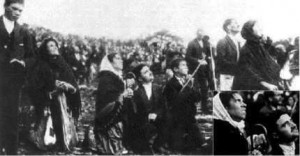 

The Miracle of the Sun (Portuguese: O Milagre do Sol) is an alleged miraculous event witnessed by as many as 100,000 people on 13 October 1917 in the Cova da Iria fields near Fátima, Portugal. Those in attendance had assembled to observe what the Portuguese secular newspapers had been ridiculing for months as the absurd claim of three shepherd children that a miracle was going to occur at high-noon in the Cova da Iria on October 13, 1917.
According to many witness statements, after a downfall of rain, the dark clouds broke and the sun appeared as an opaque, spinning disk in the sky. It was said to be significantly less bright than normal, and cast multicolored lights across the landscape, the shadows on the landscape, the people, and the surrounding clouds. The sun was then reported to have careened towards the earth in a zigzag pattern, frightening some of those present who thought it meant the end of the world. Some witnesses reported that their previously wet clothes became “suddenly and completely dry.”
Estimates of the number of witnesses range from 30,000-40,000 by Avelino de Almeida, writing for the Portuguese newspaper O Século, to 100,000, estimated by Dr. Joseph Garrett, professor of natural sciences at the University of Coimbra, both of whom were present that day. The miracle was attributed by believers to Our Lady of Fátima, an apparition of the Blessed Virgin Mary to three young shepherd children in 1917, as having been predicted by the three children on 13 July, 19 August, and 13 September 1917. The children reported that the Lady had promised them that she would on 13 October reveal her identity to them and provide a miracle “so that all may believe.”
According to these reports, the miracle of the sun lasted approximately ten minutes. The three children also reported seeing a panorama of visions, including those of Jesus, the Blessed Virgin Mary, and of Saint Joseph blessing the people.
Book of Heaven – April 7, 1929
Jesus kept silent, and I said to Him: ‘My Love, You have told me many times that one who lives in your Divine Will is a sister to all created things. I want to see whether my sister light recognizes me. And do You know how? If, in looking at it (the sun), it does not dazzle my sight.’
And Jesus: “Certainly it will recognize you. Try and you will see.”
I looked straight into the center of the sphere of the sun, and the light seemed to caress my pupil, but without dazzling me, in such a way that I was able to look into its center, at its great sea of light. How clear and beautiful it was. How true it is that it symbolizes the infinite, endless sea of light of the Divine Fiat. I said: ‘Thank you, oh Jesus, for letting me be recognized by my sister light.’ And Jesus resumed His speaking: “My daughter, even from the breath is one who lives in my Will recognized by all Creation, because each created thing feels in that creature the power of the Fiat, and the supremacy which God gave her over the whole Creation……

On May 13, 2000, Pope John Paul II was present in Fatima to preside over the beatification of Jacinta and Francisco Marto. Here are excerpts from his homily:
“‘Father, … to you I offer praise; for what you have hidden from the learned and the clever you have revealed to the merest children’ (Mt 11: 25). With these words, dear brothers and sisters, Jesus praises the heavenly Father for his designs; he knows that no one can come to him unless he is drawn by the Father (cf. Jn 6: 44); therefore he praises him for his plan and embraces it as a son: ‘Yes, Father, for such was your gracious will’ (Mt 11: 26). You were pleased to reveal the kingdom to the merest children.
“According to the divine plan, ‘a woman clothed with the sun’ (Rv 12: 1) came down from heaven to this earth to visit the privileged children of the Father. She speaks to them with a mother’s voice and heart: she asks them to offer themselves as victims of reparation, saying that she was ready to lead them safely to God. And behold, they see a light shining from her maternal hands which penetrates them inwardly, so that they feel immersed in God just as — they explain — a person sees himself in a mirror.
The Third Secret of Fatima
Although scheduled to be revealed in the nineteen-sixties, the Vatican waited until the year 2000 to disclose the third part of the Fatima secret. Following is Lucia’s account of the Third Secret.
“We saw an Angel with a flaming sword in his left hand… it gave out flames that looked as though they would set the world on fire; but they died out in contact with the splendor that Our Lady radiated towards him from her right hand. Pointing to the earth with his right hand, the Angel cried out in a loud voice: ‘Penance, Penance, Penance!’. And we saw in an immense light that is God: ‘something similar to how people appear in a mirror when they pass in front of it’ a Bishop dressed in White. We had the impression that it was the Holy Father. Other Bishops, Priests, men and women Religious were going up a steep mountain, at the top of which there was a big Cross of rough-hewn trunks… Before reaching there the Holy Father passed through a big city half in ruins and, half trembling with halting step, afflicted with pain and sorrow, he prayed for the souls of the corpses he met on his way; having reached the top of the mountain, on his knees at the foot of the big Cross he was killed by a group of soldiers… and in the same way there died one after another the other Bishops, Priests, men and women Religious, and various lay people… Beneath the two arms of the Cross there were two Angels each with a crystal aspersorium in his hand, in which they gathered up the blood of the Martyrs and with it sprinkled the souls that were making their way to God.”

5/13 Today is the Feast of Our Lady of the Blessed Sacrament, Our Lady of Fatima and Our Lady Queen and Mother of the End Times
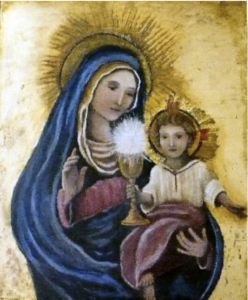
Today is the Eve of the Feast Day
of Our Lady of the Blessed Sacrament
– Our Lady of the Most Blessed Sacrament (Trad) – “Now, when I Instituted the Most Holy Sacrament, I Looked for this creature, and My Queen Mama Offered Herself to Receive this Act of Mine and the Deposit of this Great Gift, saying to Me: ‘My Son, just as I Offered You My Womb and My Whole Being in Your Conception, to Keep You Safe and Defended, I Now Offer You My Maternal Heart in Order to Receive this Great Deposit, and I Line Up, Around Your Sacramental Life, My Affections, My Heartbeats, My Love, My Thoughts – All of Myself, to Keep You Defended, Surrounded by Cortège, Loved, Protected. I Myself Take on the Commitment to Repay You for the Great Gift You are Giving. Trust Your Mama, and I will Take care of the Defense of Your Sacramental Life. And since You Yourself have Constituted Me Queen of All Creation, I have the Right to Line Up Around You All the Light of the sun as Homage and Adoration, the stars, the heavens, the sea, all the inhabitants of the air – I Place Everything Around You, to Give You Love and Glory.’ Now, Ensuring a Place for 3
Myself in which to Put this Great Deposit of My Sacramental Life, and Trusting My Mama, who had Given Me All the Proofs of Her Faithfulness, I Instituted the Most Holy Sacrament. She was the Only Worthy creature who could Keep, Defend and Protect My Act. See, then, when creatures receive Me, I Descend into them Together with the Acts of My Inseparable Mama; and Only because of this can I Perpetuate My Sacramental Life.”– V21 – 4.16.27
Click here for more informaiton on Our Lady of Fatima
AND
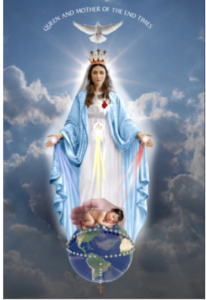
Our Lady Queen and Mother of the End Times
Illuminate my human reason so that it does not compete with my Faith, but may they be one in the Divine Light of the other.
Click here for more information on Our Lady Queen and Mother of the End Times
